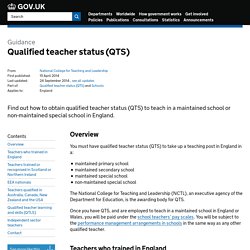

44568106. d707d4a1 712a 40a4 be9a a1c461710a72. Qualified teacher status (QTS) - Detailed guidance. Overview You must have qualified teacher status (QTS) to take up a teaching post in England in a: maintained primary school maintained secondary school maintained special school non-maintained special school The National College for Teaching and Leadership (NCTL), an executive agency of the Department for Education, is the awarding body for QTS.

Once you have QTS, and are employed to teach in a maintained school in England or Wales, you will be paid under the school teachers’ pay scales. You will be subject to the performance management arrangements in schools in the same way as any other qualified teacher. Teachers who trained in England When you have finished your training, the initial teacher training provider will inform us of your results. Basic requirements - Get Into Teaching. Getting good basic qualifications is the first step towards becoming a teacher.

To achieve qualified teacher status (QTS), you'll need to consider these four requirements. GCSEs To start teacher training you'll need C-grade GCSEs (or standard equivalents) in: English maths a science subject if you want to teach primary or key stages 2/3 (up to age 14) If you don't have the necessary GCSEs in maths, English or science, you may be able to take a pre-entry test set by your teacher training provider. If you have qualifications from outside the European Economic Area (EEA), the National Academic Recognition Information Centre (NARIC) will be able to advise you on whether these are equivalent to the minimum requirements set out above.
Degree You need a degree to gain QTS . In some subjects, your degree class may also influence the amount of financial support available to you. School experience Skills tests The first attempt at taking your skills tests in each subject is provided free of charge. Head Teacher Career Guide - Education and Childcare Jobs. A head teacher is the most senior teacher and leader of a school, responsible for the education of all pupils, management of staff, and for school policy making.

Head teachers are the most senior teachers and leaders of primary and secondary schools, sixth-form colleges and, less commonly, further education colleges. There are around 18,000 primary school and 3,500 secondary school head teachers in England. Head teachers are ultimately responsible for the smooth running of a school, the academic achievement of its pupils and the management of its staff. Although they are usually teachers with many years’ experience, the emphasis of their role is to provide educational vision and direction rather than teaching in classrooms. Head teachers lead, motivate and manage staff by delegating responsibility, setting expectations and targets and evaluating staff performance against them. Salary Secondary schools tend to offer higher salaries than primary schools for a number of reasons.
Responsibilities. Secondary school teacher Job Information. Page Content Secondary school teacher Hours39+ per weekStarting salary£22,023 + per year.

From trainee to NQT. The transition from trainee to NQT is a turbulent time that can leave even the most prepared teachers questioning their chosen career.

Kate Herbert reveals how to survive being tossed in at the deep end A year ago, I was in pieces. I spent the last week of my Christmas "holidays" writing 14 essays and tasks (shorter, practical essays) due at the start of the spring term of my PGCE course. Just thinking about it makes me feel sick. I still don't know how my course mates without English or arts degrees coped with the quantity of writing required. So much has changed. Despite earning a real salary for the first time in more than a year, it will take a long time to recover from the financial hardships of being a PGCE student. If trainee teachers weren't offered that allegedly "golden" hello, I can't imagine how anyone could afford to go into teaching. As a trainee, the amount of planning required for our teaching practices was horrendous.
Thankfully, things soon slotted into place. Teacher training options - Get into teaching - Teaching Agency. Liam and Laura, two trainee teachers, talk about school- and university-led initial teacher training, and the benefits of both.

As well as deciding which age group and subject you would like to teach, you can choose from various types of teacher training courses depending on your qualifications, experience, and where you want to train. Courses are available throughout England, so you have plenty of options when it comes to the location of your training. Becoming a Teacher - UK Teacher Training. Teaching is an important and increasingly popular choice of career for all kinds of people.

Whatever your circumstances – if you're still at school, about to graduate, or looking for a change of direction – there are more ways to enter the profession and more support available to help you get there than ever before. Ways into Teaching It doesn’t matter who you are, to become a fully qualified teacher in state-maintained schools in England and Wales, you’re going to have to gain Qualified Teacher Status (Q TS) first. Almost always, that means completing a programme of initial teacher training ( ITT).
Combining theoretical learning with at least 18 weeks spent practising teaching on placements in schools, ITT helps you to develop the skills you need to become an effective teacher and achieve qualified teacher status (QTS). ITT comes in all shapes and sizes, providing options to suit everyone - no matter what your qualifications, experience, preferences or personal circumstances.